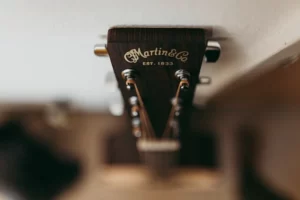Bass players are always looking for that perfect tone. Whether it’s a warm, deep tone or a bright and punchy sound, many factors contribute to the overall style of your bass. One of the most important factors is the scale length of your bass. There are two types of scales: short scale and long scale. Each type has its unique benefits and drawbacks, so which one is right for you? In this short scale vs long scale bass article, we’ll look at the differences between these two scales and help you decide which one is right for you.
Short Scale vs Long Scale Bass
Both basses have different tonal qualities, string spacing, neck widths, and fret sizes. Short scale bass guitars are typically more comfortable for smaller hands, while long scale bass guitars have a deeper tone. It’s essential to know the difference between these two kinds of basses to make an informed decision on which one is right for you.
A short scale bass guitar may be a better option for you if you’re starting out. They’re typically more comfortable to play, and they’re easier to learn how to play. If you’re looking for a deeper tone, along scale bass guitar is a better option. They’re not as comfortable for smaller hands, but they produce a richer sound.
So, which type of bass guitar is right for you? It depends on your individual preferences. Try out both kinds of bass guitars and see which one feels more comfortable to you. Let’s take a closer look at both scales to see which one is best for you.
Short Scale Bass
Short scale bass guitars are becoming more and more popular with bass players because of their unique sound, feel, and playability. They are perfect for players who want the classic bass sound but don’t want or need a long scale bass. Short scale bass guitars are great for players of all skill levels, and they come in a variety of different shapes and sizes.
Most short scale basses have a scale length of 30 inches or less, making them easier to play than long scale basses. They also tend to be lighter and more compact, making them perfect for players who want a bass that is easy to transport and doesn’t take up a lot of space.
Short scale bass guitars are available in both acoustic and electric models. Acoustic bass guitars are perfect for players who want to play at home or in small venues, while electric short scale bass guitars are perfect for players who want to rock out on stage.
The short scale bass have a unique sound that is different from the sound of a long scale bass. They are typically brighter and more articulate than long scale basses, making them perfect for playing funk, soul, and jazz music. Short Scale Bass guitars also have a slightly tighter low end than long scale basses, which makes them ideal for playing blues and rock music.
Pros
- It can be easier to play for beginners
- A slightly smaller size can be more comfortable for some people
- Often have a brighter sound than long scale basses
Cons
- It can be more expensive than long scale basses
- Some people may find the shorter scale size harder to play accurately
Who prefers short scale bass?
The short scale bass guitar is designed for smaller players or those who prefer a shorter scale length. It’s also an excellent choice for beginners who are just starting out. The shorter scale length makes it easier to control the strings and provides a more comfortable playing experience. If you’re looking for an easy-to-play bass guitar perfect for smaller players, the short scale bass is a great option.
Long Scale Bass
The history of the bass guitar can be traced back to the early 20th century when it was mainly used as a backup instrument in orchestras. In the 1950s and 1960s, the bass guitar became more prominent in popular music. It soon became a staple of funk, soul, and rock music.
The bass guitar has a long scale length, which gives the instrument a deep, rich tone. The long scale also makes the bass guitar more challenging than other guitars. The strings on a bass guitar are thicker and longer than those on a standard guitar, requiring more strength and dexterity to fret.
Long scale bass guitars are becoming more and more popular as musicians discover their benefits. In addition to a broader range of sounds, long scale bass guitars also provide greater string tension, which results in a tighter, more focused tone. This makes them ideal for genres such as metal and punk, where a heavy sound is desired.
Most bass guitars have a scale length of 34 inches, but long scale basses have a scale length of 36 inches. This may not seem like much difference, but it makes a big difference in tone and playability. The extra length gives the strings more tension, making them sound brighter and punchier. Long scale bass guitars are popular among metal and rock bassists, who need a thick and powerful tone to power their music.
The long scale basses are ideal for players with large hands or who prefer a more stretched-out feel. They are also great for playing low notes, which can be challenging to play on a standard-scale bass guitar.
Consider a long scale bass guitar if you’re looking for a bass guitar that delivers a rich, full sound and feels great to play. You won’t be disappointed!
Pros
- The tone is warm and mellow
- Rich harmonic overtones
- Bass notes sound fuller and rounder
- It can be played very softly without losing clarity or definition
- Great for jazz and classical music
Cons
- It can be more challenging to find the right strings and accessories
- Maybe more expensive than other types of bass guitars
Who prefers long scale bass?
Long scale basses are for players who want a bass with more range. The extra length of the scale allows for more precise intonation and gives the player more room to work on the fretboard. This makes long scale basses a popular choice for players who want to be able to play in a wide variety of styles. Long scale basses are also well-suited for players with larger hands, as they can be a bit more cumbersome to play on shorter scales. If you’re looking for a bass that can handle a wide range of music, or if you have large hands, a long scale bass may be the right choice for you.
Short Scale vs Long Scale Bass Similarities and Differences
Most people would say that these two bass guitars have a lot in common, so it might be tricky to emphasize significant differences or name some essential similarities as they both serve the same purpose.
Similarities
- Both scales have their unique tonal quality that different players often favor.
- Build quality is relatively the same, with both scales being well-crafted.
- Playability is also very similar on both scales.
- The pickups and other electronics are typically in the same place on both types of basses.
- Both scales are relatively affordable.
Differences
- Fret spacing is different on short and long scale basses, with the fret spacing being closer together on a short scale bass. This can make it difficult for players with large hands to play on a short scale.
- Short scale basses are typically about 30 inches long, while long scale basses are around 34-36 inches long. This can make a big difference if you are looking for a comfortable bass to play.
- The strings on a short scale bass are also typically thicker than those on a vast scale bass, resulting in a different tone.
- The short scale bass is relatively lighter in weight than the long scale bass, making it easier to transport.
Top Pick Between Short Scale and Long Scale Bass
There are a lot of things to consider when choosing a bass guitar. You have to think about the type of music you want to play, your budget, and the size of the instrument. One crucial factor to consider is the scale length.
Most people think that the short scale is best for beginners because it’s easier to play. But some people believe that the long scale is better for beginners because it’s more challenging and teaches you how to play better. So, which one should you choose?
Well, it depends on your personal preference. If you want something that will be easier to play, go with the short scale bass guitar. But if you want something that will be more challenging and teach you how to play better, go with the long scale bass guitar.
Either way, you’re getting an excellent beginner bass guitar. They’re both made with high-quality materials, and they both sound great. So, it comes down to what you want in a bass guitar. Do you want something that’s going to be easy to play, or do you want something that will be more challenging? It’s up to you!
No matter what you choose, make sure you get the right instrument for your needs. There is no wrong choice, just different options for different players. So, pick the scale length that best suits you and start playing!
Conclusion
So, which is better for you- a short or long scale bass guitar? It depends on your playing style and preferences. The short scale bass is excellent for beginners or players with smaller hands because it’s easier to hold and play. The long scale bass is perfect for those who want a deeper, richer tone. Ultimately, the choice is up to you! Have you decided yet whether you want a short scale or long scale bass guitar? Remember that the best way to find out is to try both out and see which you prefer. Thanks for reading!
Editor’s Choice: Check out an on best short scale bass under $500.
Read more: Bass vs Guitar: The battle of the two stringed instruments
FAQs: Short Scale vs Long Scale Bass
Q: What is the best short scale bass guitar?
A: The best short scale bass guitar depends on your playing style and preferences. Some famous short scale bass guitars include the Fender Mustang, Fender Bronco Bass, Ibanez Mikro, and Gretsch G2220.
Q: Who plays short scale bass guitar?
A: Short scale basses are popular with beginner and advanced bass players. Some well-known short scale bass guitar players include Stanley Clarke, Bill Wyman, Gene Simons, and Paul McCartney.
Q: Why play a short scale bass guitar?
A: Short scale bass guitars are more accessible to play than long scale bass, making them excellent for beginner bass players. They are also popular with bass players who want a more compact and lightweight bass guitar.
Q: How many frets do I need on bass guitar?
A: The number of frets on a bass guitar depends on the type of music you want to play. Most bass guitars have between 20 and 24 frets. Bass guitars with fewer frets are ideal for playing traditional blues and country music, while bass guitars with more frets are better suited for heavier rock and metal music.
Q: Does Fender make a short scale bass?
A: Fender offers short scale models such as Mustang and Bronco, but if that’s not enough, check out Ibanez or Gretsch. Yamaha also has a few short scale bass guitars in their line-up.
Q: How do you measure bass scale length?
A: The scale length of a bass guitar is measured from the nut to the bridge. The nut is the small piece of plastic or wood at the top of the guitar’s neck, while the bridge is the piece of metal or wood at the bottom of the guitar.
Q: What are the drawbacks of short scale bass?
A: Short scale bass guitars may not suit players who want to play heavier rock or metal music. Also, short scale strings are harder to get, and there is a myth about low E string definition due to less string tension. They also tend to have a less powerful tone than long scale bass guitars.
Q: Can I put long scale strings on a short scale bass?
A: Yes, you can put long scale strings on a short scale bass guitar. However, the strings may be too loose and may not stay tuned on short scale strings. To ensure the strings are correctly aligned, you may also need to adjust the action (the distance between the strings and the fretboard) on your bass guitar.
Q: What is the difference between a short scale and long scale bass?
A: The scale length of a bass guitar is the distance from the nut to the bridge. Short scale bass guitars have a scale length of 30 inches or less, while long scale bass guitars have a scale length of 34 inches or more. Short scale bass guitars are more accessible to play than long scale bass guitars, making them excellent for beginner bass players. They are also popular with bass players who want a more compact and lightweight bass guitar. Long scale bass guitars are better suited for playing heavier rock and metal music.









